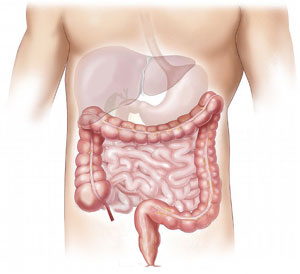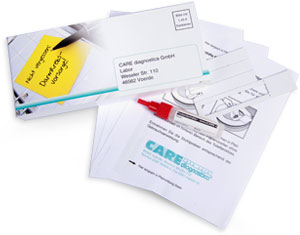
Colon cancer can affect anyone
Every year 55,000 people develop colon cancer in Germany and 23,000 people die of it.
Warnings are too late
The insidious thing about colon cancer is that it often grows years in the bowel without causing symptoms.
Colon cancer is curable by early detection
In contrast to many other cancer diseases, colon cancer has the chance to be prevent completely by preventative measures or to detect it at such an early stage that it can be cured.
Colon cancer is one of the most common cancer diseases in Germany. In addition to the food- and lifestyle habits, genetic factors are particularly involved to the development of colon cancer. A familial prestress means an increased risk for this insidious disease. Use the knowledge to avoid colon cancer for yourself and your family as best you can.
What is colorectal cancer?
The term colorectal cancer refers to a malignant tumor in the colon or rectum. Malignant tumors in the small intestine are in contrast extremely rare.
Colorectal cancer is one of the most researched cancers in humans. It is known that approximately 90% of colorectal cancer diseases develop from initially benign intestinal polyps. The degeneration of the intestinal polyp (adenoma) to the cancer (carcinoma) can take about 10 years.
The malignant tumor occurs gradually and often completely unnoticed. When typical symptoms like stomach pain, bowel irregularities or visible blood in the stool occur, the disease is often in an advanced state already. Early detection plays an important role in colorectal cancer. Early detection is the most effective weapon against this disease.
Testen Sie Ihr Risiko und erfahren Sie, wann Sie zur Vorsorge gehen sollten.



